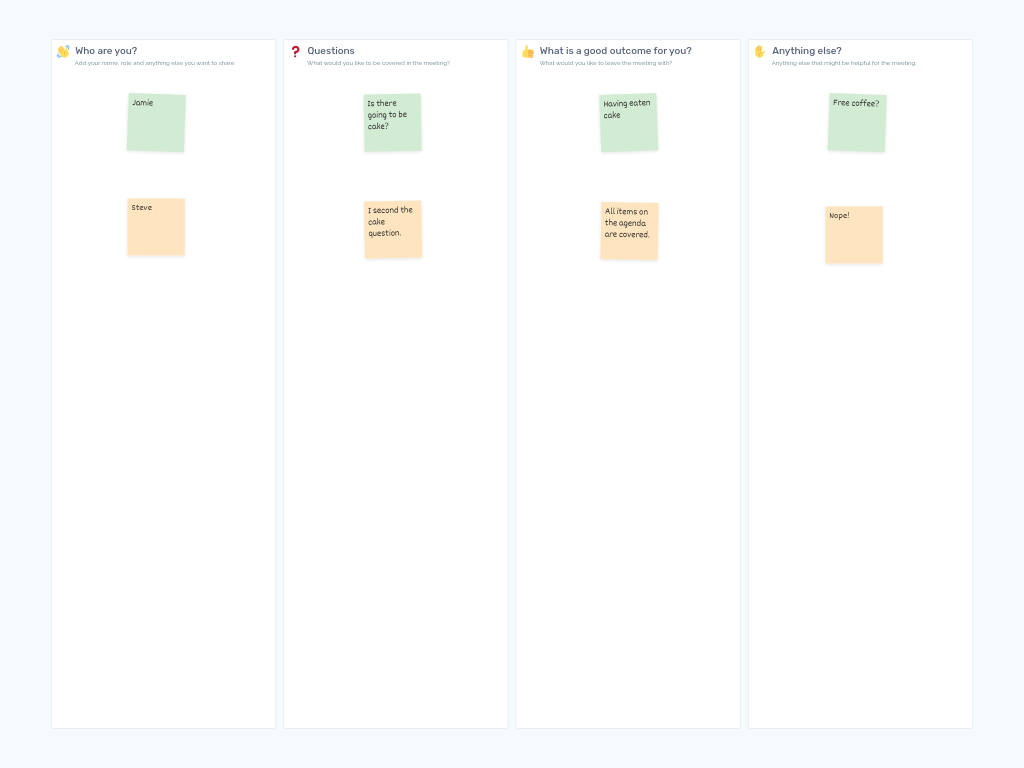Pre-Meeting Questions Template
Gather crucial information from participants before your meetings to ensure more focused, productive sessions. This collaborative template helps you collect questions, expectations, and desired outcomes before diving into the actual meeting, demo, or workshop.
What Is the Pre-Meeting Questions Template?
The Pre-Meeting Questions template is a structured way to gather information from participants prior to a scheduled meeting or workshop. It creates a dedicated space for team members to share their expectations, questions, and desired outcomes, allowing facilitators to better prepare and tailor the meeting content to participant needs.
This template is organized into four clear zones that help capture all relevant information:
- Who attendees are
- Questions they have
- Their desired outcomes
- Additional information they want to share
Benefits & When to Use
This template is particularly valuable when:
- Planning complex meetings where participant expectations may vary
- Preparing for workshops where you need to understand attendee knowledge levels
- Organizing demos where you want to focus on specific features based on interest
- Running meetings with new team members or stakeholders
- Facilitating sessions with limited time where prioritization is essential
Benefits include:
- More focused meetings that address actual participant needs
- Increased participant engagement by addressing their specific questions
- Better preparation for facilitators who can anticipate discussion points
- Reduced meeting time wasted on irrelevant topics
- Documentation of expectations that can be revisited after the meeting
How to Run a Pre-Meeting Session
Set up the template (5 minutes)
- Share the board link with participants at least 24-48 hours before the meeting
- Consider enabling private writing by using the "Start Meeting" function if you want responses to remain hidden from other participants
Invite participants to contribute (15-30 minutes)
- Ask participants to add their information to each zone:
- "Who are you?" - Name, role, and any relevant background
- "Questions" - Topics they want covered during the meeting
- "What is a good outcome for you?" - Their expectations and goals
- "Anything else?" - Additional context or information
- Ask participants to add their information to each zone:
Review responses (15 minutes)
- Before the meeting, review all contributions to identify common themes
- Prioritize questions and topics based on frequency and importance
- Adjust your meeting agenda to address the most critical items
Start the meeting with a recap (5 minutes)
- Begin by acknowledging the pre-submitted questions
- Clarify which topics will be covered and which might be addressed later
- Set expectations about what can realistically be accomplished
Revisit outcomes at meeting conclusion (5 minutes)
- Return to the "good outcomes" section to check if participant expectations were met
- Note any outstanding items for follow-up
Tips for a Successful Session
- Set a clear deadline for submitting pre-meeting questions to give yourself enough time to prepare
- Group similar questions to streamline your responses and meeting flow
- Don't overwhelm participants with too many pre-meeting tasks; keep it simple and focused
- Follow up on unanswered questions after the meeting to show you value all input
- Consider using different colored sticky notes for different types of participants (e.g., team members vs. stakeholders)
- For recurring meetings, save the board to track patterns in questions and concerns over time
- Be transparent about which questions will be addressed in the meeting and which will require follow-up
By collecting information beforehand, you'll run more effective meetings that respect everyone's time and address actual team needs rather than assumptions about what's important.



